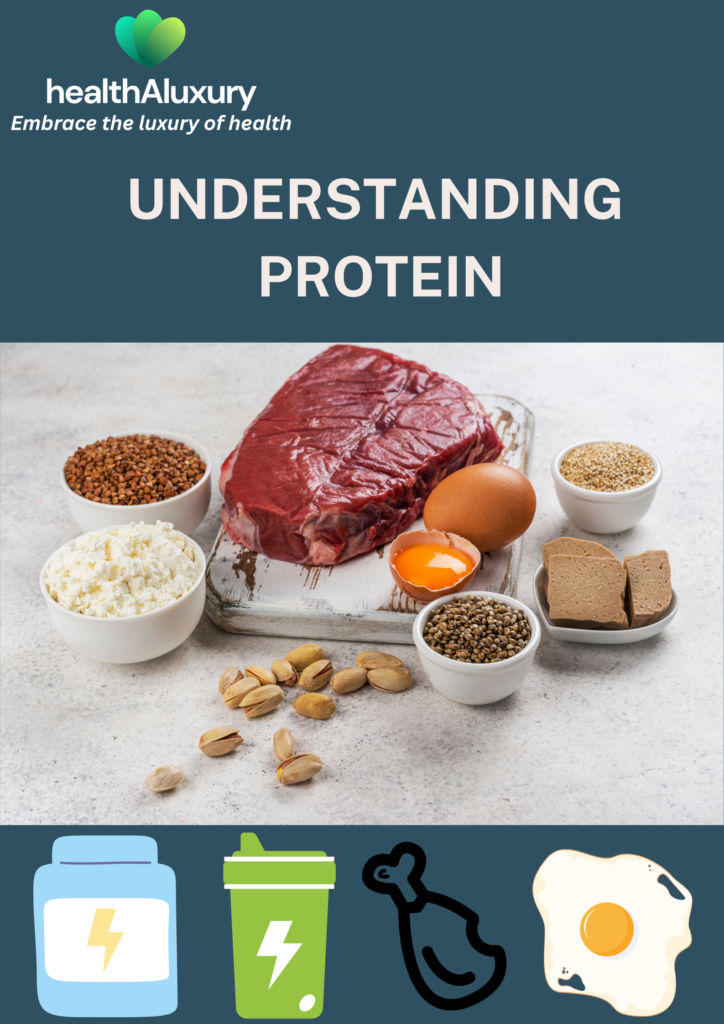
What is Protein?
Protein is an essential micronutrient made from twenty-plus basic building blocks called amino acids. There are 9 amino acids must come from food. Protein is found throughout our body and it makes up the enzymes and the hemoglobin that carries oxygen in your blood. Protein is often referred to as the building block of life, and rightly so. It plays a key role in nearly every biological process in the body.
Why Protein is so important
- Foundation for Growth and Repair
Protein is essential for the growth and repair of tissues. Our muscles, organs, skin, hair, and even nails are all made from protein. Whether you’re recovering from a workout, healing from an injury, or simply replacing old cells, your body needs protein to repair and regenerate these tissues. Without adequate protein, the body struggles to maintain this critical function.
- Supports Metabolic Processes
Protein isn’t just about muscles—it’s also involved in countless metabolic processes. Enzymes, which are made of protein, help speed up chemical reactions in the body, from digesting food to producing energy. Additionally, hormones like insulin, which regulate blood sugar, are protein-based. A protein-rich diet helps keep these vital processes running smoothly.
- Helps in Weight Management
For those of you aiming to lose or maintain weight, protein can be a valuable ally. High-protein foods tend to be more satisfying, helping you feel fuller for longer. This reduces overall calorie intake and helps prevent overeating. Protein also has a higher thermic effect than fats and carbs, meaning the body uses more energy to digest it, further boosting metabolism.
- Essential for Immune Health
Our immune system relies heavily on protein. Antibodies, which help fight off infections, are made from protein. A deficiency can impair immune function, making it harder for the body to fend off illness. Ensuring that you get enough protein can help strengthen your immune defenses.
- Maintains Muscle Mass as We Age
As we age, maintaining muscle mass becomes more challenging. This process, known as sarcopenia, can lead to a decline in strength and mobility. Regular protein intake, combined with resistance exercise, helps prevent muscle loss, preserving physical function and independence as we grow older.
- Variety in Sources and Benefits
Protein comes from both animal and plant sources—meats, dairy, eggs, legumes, nuts, seeds, and more. Each source brings with it additional nutrients, like fiber from plant-based proteins or healthy fats from fish. Balancing different sources ensures that you’re getting not only protein but also a spectrum of other beneficial nutrients.
Here are 10 protein foods for you
How much protein do I need daily?
According to National Academy of Medicine, an adult requires a minimum of 0.8 grams of protein for every kilogram of body weight per day, or just over 7 grams for every 20 pounds of body weight.
Refer this article for more details – https://nutritionsource.hsph.harvard.edu/what-should-you-eat/protein/
Conclusion:
In summary, protein is much more than just a nutrient—it’s the foundation of good health. From building muscle to supporting immune function, controlling weight, and maintaining vitality as we age, it is indispensable. By making conscious choices to include high-quality protein in your meals, you’re giving your body the tools it needs to thrive.
